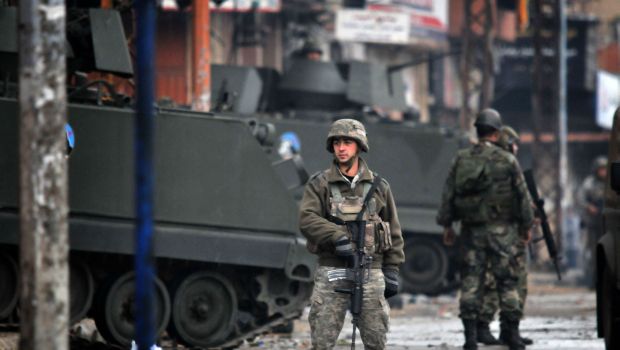
Lebanese army soldiers patrol a street in the northern Lebanese city of Tripoli on December 4, 2013 as the army deployed following clashes between supporters and opponents of Syria’s regime (AFP PHOTO/IBRAHIM CHALHOUB)
The Lebanese army command said: “Due to the security measures taken by the army, 21 people were arrested in Bab Al-Tabbaneh and Jebel Mohsen areas for various violations including firing gunshots. The intelligence department has referred eight of them to military prosecution while interrogations continue with the others. The army units continue to carry out security measures to impose security and restore normality.”
The Lebanese government turned over control of security in the country’s second-biggest city to the military on Monday, after spiraling sectarian violence in recent days led to gun battles in the streets.
Analysts blame the violence on continuing conflict in neighboring Syria, which has created friction in the city between Alawites in the Jebel Mohsen district, sympathetic to the Syrian government led by Bashar Al-Assad, against Sunni inhabitants of Bab Al-Tabbaneh, sympathetic to the Syrian rebel movement.
Tensions worsened following the bombing of two mosques in the city in August. Lebanese authorities have charged a local Alawite leader, former MP and leader of the Arab Democratic Party Ali Eid, with helping a suspect in the bombing flee the country, exacerbating sectarian tensions in the city.
Internal security forces carried out foot patrols in the city and erected checkpoints at major junctions to control and monitor traffic.
Despite coordination between the army and leaders of the armed groups in Tripoli, the army came under fire in the Bab Al-Tabbaneh area on Tuesday. One Lebanese army sergeant was injured.
Meanwhile, snipers continued to fire at passers-by on the main highway which links Tripoli with Akar, causing injuries.
Lebanon’s caretaker prime minister, Najib Mikati, held meetings with a number of dignitaries from the Bab Al-Tabbaneh to discuss the latest developments.
Within the city, fighters in the Sunni district of Bab Al-Tabbaneh said they feared being targeted by the army following a number of arrest warrants issued against others in the area.
However, others dismissed the warrants, and one told Asharq Al-Awsat: “The aim of the warrants is to apply psychological pressure especially that the names on these warrants are of those who were wanted anyway, and do not include any of the main fighters.”
The imam of Khalid Bin Al-Walid Mosque in Bab Al-Tabbaneh, Sheikh Walid Tabboush, told Asharq Al-Awsat: “It seems that the warrants will target people who are not main players, whose arrest would cause unrest. So far, those whose names we know in Bab Al-Tabbaneh and Jebel Mohsen, may have fired shots at people or threatened others, but the arrests of Rifaat Eid or his father Ali Eid, who are wanted in Jebel Mohsen, or the arrest of the leaders of the armed groups in Bab Al-Tabbaneh, would need political cover, which they do not have so far.”
A senior religious source in Tripoli, speaking on the condition of anonymity, told Asharq Al-Awsat: “We do not know how things will develop in Tripoli under the command of the army, but what is certain is that the issue will take a long time.
“This is a plan which has been detailed and which relies on a policy of gradual progress in order to control the two areas. It is untrue that Bab Al-Tabbaneh is being targeted. The plan has started, and the next few days will not be easy.”
In the meantime, residents of the city have not shown confidence in the new security measures, which they see as a repeat of previous plans. Ammar Haddad, a shopkeeper, told Asharq Al-Awsat: “Nothing has changed. I think this is the 18th time the army has deployed in Bab Al-Tabbaneh and Jebel Mohsen, and the fighting does not stop.”
One resident said: “Why did they declare Tripoli as a military zone at the start, only to deny that and say it is only under army control? This is weakness and hesitation, and [shows] a lack of confidence in the decisions.”
Doctor Zaini, an orthodontist, said: “They treat the problems but not the causes, which will make things worse. They cannot control one area without controlling the other, and this is not a solution.”
Zaini added: “We are a generation who lived through war and we know the value of the army, and the army is a thousand times more important to us than the armed insurgents who make our lives hell. We want a fair country.”
Ammar Haddad said: “There is greater fear from the fighters of Bab Al-Tabbaneh than those of Jebel Mohsen, because they live with us in the city. Our lives are no longer safe, and theft and assaults have increased, but this does not make us demand their punishment and they move freely in Jebel Mohsen with impunity. Our problem is that our state is weak and incapable.”
Other residents questioned by Asharq Al-Awsat called on the army to arrest the fighters from Bab Al-Tabbaneh, as well as those accused of involvement in August’s bombing, in order to resolve the crisis.
